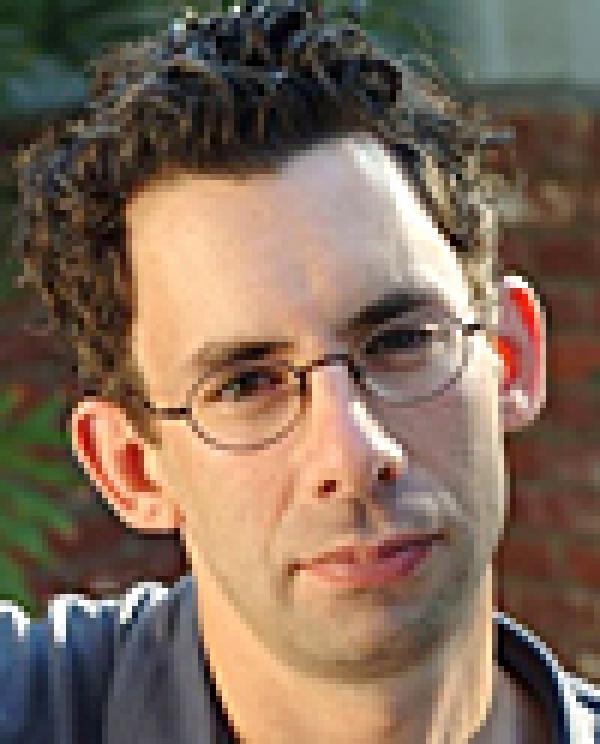Bret Anthony Johnston

Bio
Bret Anthony Johnston is the author of Corpus Christi: Stories (Random House). His work appears in The Paris Review and Tin House, and in numerous anthologies, including New Stories from the South: The Year's Best 2003, 2004, and 2005. He is currently completing a novel and editing an anthology, both forthcoming from Random House. He can be reached on the web at www.bretanthonyjohnston.com
Photo by Stephanie Diani
Author's Statement
When I got the phone message about this generous grant, I thought the man at the other end of the line was one of my buddies, playing a practical joke. I listened to the message no less than twenty times; I turned up the volume on my receiver, searching for the hint of a laugh between the words. Then I called my buddy and cussed him out for raising my hopes. He claimed not to know what I was talking about. I told him to give it a rest and come clean. When he didn't, I cussed him out again and hung up on him.
Now, even with the NEA's generosity confirmed, this still feels like a rouse to me. I'm waiting for the call that will retract everything, the call that will explain how my name mistakenly wound up on this luminous list.
After learning the names of the other recipients and the names of the esteemed panelists who've afforded us the luxury of time, I'm as proud as I am humbled, as intimidated as I am inspired. The real gift of the NEA, however, is neither the time nor the funding; it's having your work read so closely—sympathetically, intelligently, ideally—that it achieves its truest potential. This is the deepest, most endangering desire of every writer: to be read. Bestseller lists, prestigious tables of contents, high-profile prizes, film options, these are exciting prospects, but finally they're just the keys that open the door to what we really and truly want: Readers.
To the NEA, I offer my most sincere gratitude, both as a writer and a reader: I'm grateful not just for what you've given me, but for what you've given all of this year's recipients, for what you've given all of the country's readers.
To my buddy who seems not to have been pulling my leg, I offer an apology: I'm sorry I hung up on you, and I'm sorry I called back to say that about your mother.
From the short story "The Widow"
Linda "Minnie" Marshall was fifty-five when the doctor said cancer. Her boys were both gone. Richard - husband and engineer, taker of early retirement package, reader of mysteries and griller of lobster - had died six years before; Lee had lived in Missouri since college. She worked as an accountant, owned a late model Oldsmobile and lived in the three-bedroom house the life insurance had paid off. She had seen the doctor because she'd been more tired than usual - her potassium was low again, she'd guessed. The exhaustion could have been a blessing; her body could have finally been adjusting to a life alone, settling into a routine without the boys, and if she honored the change, her days might bring her happiness again. If not happiness, at least less sorrow. But the doctor had sat heavily on the rolling stool, removed his glasses, and outlined options for treatment. Because he gave her a fair chance for recovery, she knew she would die.
She had considered not telling Lee of the disease, had considered letting it run its course untreated. He would be cowed by the diagnosis - she knew this as surely as she knew his name - and he would not understand how it could come as a relief. For years he'd beseeched her to move beyond his father's death, and now, finally, she would. Then, unexpectedly, she was mortified and needed him home. She needed his company in the chemo ward, needed to see him when the oncologist pressed the stethoscope to her back or pointed to x-rays where the tumor in her lung glowed like a star. She needed him to interpret what the doctors said; she did not want him to censor the information, but he lied and she knew it. When she asked him about the flashes of color in her peripheral vision, pinwheels and splotches and starbursts, he blamed the sun or tricks of light. When she asked about her ruined handwriting, he claimed to see no difference. When she asked how long she would live, he said you couldn't trust doctors.
Dressing for the appointment took over an hour. Breakfast had drained her, and now she was winded doing her make-up, weak-legged slipping into her skirt. Every button was a chore. How perfectly easy it would have been to stretch out and shut her eyes, but she pressed on because she'd already cancelled the meeting twice. She thought to take a nerve pill, but decided against it; she was bleary enough. For years she'd rushed to dress for work and get Lee to school, and now she wondered how she'd ever managed. A wave of pride rolled inside her. The doctors had said her memory would fail, and often she'd forgotten what she tried to remember, but the unbidden past returned vividly. The musky scent of Richard's hair gel; the sequined fabric she'd sewn for one of Lee's Halloween costumes; years later, the noise of him and his girlfriend in the shower, thinking she should be angry, but really feeling pleased; the mower still idling on the afternoon she found Richard in the half-cut yard; the thought thirty minutes before, I bet he's thirsty; the grass clippings on the glass of water she'd brought him. The memories assailed her, asleep or awake. She wore them like pearls.

